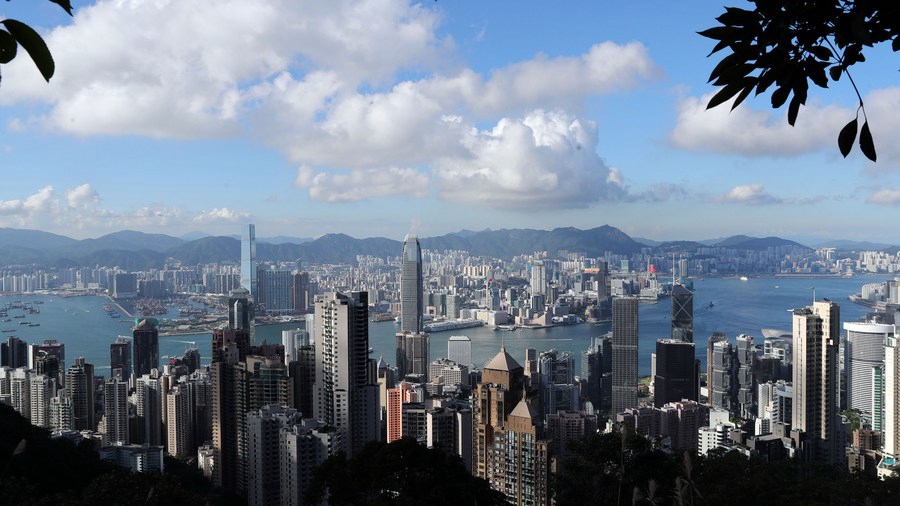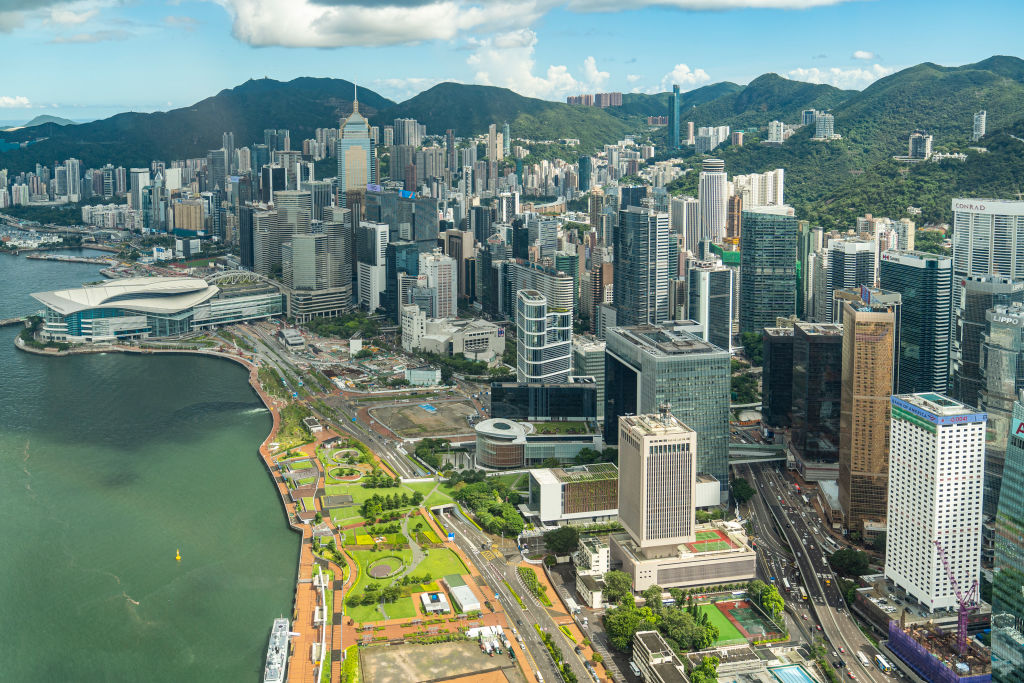
The Victoria Harbor in Hong Kong Special Administrative Region, south China, June 11, 2020. /Xinhua
The Victoria Harbor in Hong Kong Special Administrative Region, south China, June 11, 2020. /Xinhua
Editor's note: Tian Feilong is an associate professor at Beihang University's Law School and director of the Chinese Association of Hong Kong and Macao Studies. The article reflects the author's opinions and not necessarily those of CGTN.
On January 11, 1982, then-Chinese leader Deng Xiaoping proposed "One Country, Two Systems" during a meeting with Yao-Tzu Li, president of the Chinese American Association. The proposal was based on then-Chairman of the National People's Congress Standing Committee Ye Jianying's nine principles for the peaceful reunification with the Taiwan region and established a clear jurisprudential framework for China's peaceful reunification and the formulation of strategic decisions on modernization.
Since then, "One Country, Two Systems" has become a consistent principle and strategic guideline adopted by the central government to address the peaceful reunification with the Hong Kong and Macao special administrative regions (SARs) and the Taiwan region, as well as the country's modernization.
The political and ideological origins of "One Country, Two Systems" can be traced back to the "unity in diversity" policy in traditional Chinese governance and the strategic plan by the Communist Party of China (CPC) on the Taiwan question. Mao Zedong and other members of the first generation of the CPC leadership had already explored and discussed the strategic concept and institutional principles of "One Country, Two Systems."
Based on this, Deng Xiaoping, taking into consideration the strategic environment of reform and opening up and the demand of national development, further delineated the idea in terms of jurisprudence and policymaking and used it as a guideline to continuously explore solutions on the Taiwan question and the optimal pathway to solving the Hong Kong and Macao questions.
"One Country, Two Systems" manifests multiple facets of innovation and institutional breakthroughs. First, it integrates the peaceful reunification of the country with national modernization, which means the process of national reunification is aligned with peace and development – two themes Deng Xiaoping identified as essential to the world's development. In this way, "One Country, Two Systems" not only coordinates various domestic targets related to reunification but also creates connectivity between China and the rest of the world.
Second, "One Country, Two Systems" is underpinned by the recognition of an ever-changing world free from cold war. The world is by no means characterized by cold war, and only a development model featuring peace and common prosperity can lead to a Chinese path free from that. The creative practice in the Hong Kong and Macao SARs and China's Taiwan is meaningful for exploring the path for China and the world.
Third, "One Country, Two Systems" allows sovereign countries to support the establishment of a highly autonomous local system, realizing "One Country" as the basic sovereignty and the "Two Systems" interacting with each other constructively. The optimization and evolution of systems resulting from the co-existence, competition and integration among different systems constitute an important contribution to the modernization of China's governance.
Fourth, "One Country, Two Systems" provides the best platform and reference for the Chinese mainland to draw on the reasonable institutional and technological elements of Western capitalism. It has helped China to structurally accelerate its reform and opening-up and modernization and effectively expanded China's knowledge of capitalism and globalization, as well as its concrete experience in risk management.

The skyline and buildings in the business district of Hong Kong Special Administrative Region, south China, September 20, 2021. /Getty
The skyline and buildings in the business district of Hong Kong Special Administrative Region, south China, September 20, 2021. /Getty
"One Country, Two Systems" has played an indispensable role in the past four decades of reform and opening up. First, "One Country, Two Systems" has helped realize the peaceful return of the Hong Kong and Macao SARs to China and the formulation and implementation of the two Basic Laws, contributing to the long-term prosperity of the two SARs and supporting China's modernization. The establishment of the Guangdong-Hong Kong-Macao Greater Bay Area will further utilize the institutional strength of "One Country, Two Systems" and the trend of globalization.
Second, the implementation of "One Country, Two Systems" and the Basic Law play an important part in the constructive interactions between the two SARs and the Chinese mainland. It has also boosted the modernization of governance and the rule of law in China and helped the country better understand modern governance and the rule of law in the West.
Third, the implementation of "One Country, Two Systems" in the Hong Kong and Macao SARs and its institutional experience in facing challenges, such as the introduction of the Law of the People's Republic of China on Safeguarding National Security in the Hong Kong Special Administrative Region (HKSAR), the electoral system improvements in the HKSAR and the implementation of the principle of "patriots governing Hong Kong" are useful references for us to understand "One Country, Two Systems" and explore an approach for the Taiwan question.
"One Country, Two Systems" is expected to remain unchanged in the Hong Kong and Macao SARs for 50 years since their return to China. However, the approach to the Taiwan question is still open for exploration, which demonstrates the political wisdom and creativity of this principle. This year marks the 40th anniversary of Deng Xiaoping's first clear proposal of the "One Country, Two Systems" and the 25th anniversary of the implementation of the Basic Law of Hong Kong. This year is also a critical year for cross-Strait relations.
Reviewing the historical context and the institutional mechanism of "One Country, Two Systems" in national governance and development will help us better understand the jurisprudence and policy optimization of the principle in the new era.
On December 20, 2021, the State Council Information Office of China released a white paper titled "Hong Kong: Democratic progress under the framework of One Country, Two Systems," which gives a holistic picture from the historical origin to the future development of democracy in the HKSAR. It provides the most authentic interpretation of "One Country, Two Systems" in the HKSAR. Therefore, it has helped restore democracy in the HKSAR and will inspire the governance and institutional progress in Macao and Taiwan.
2021 marked the centenary of the CPC. It was also a crucial year for formulating the road map and targets of the Party's governance for the next century. "One Country, Two Systems" was regarded as an important principle for national rejuvenation and the modernization of governance in both Xi Jinping's speech marking the centenary of the CPC and the Resolution of the CPC Central Committee on the Major Achievements and Historical Experience of the Party over the Past Century adopted at the sixth plenary session of the 19th Central Committee of the CPC. It is also seen as a strategy to bolster connectivity between China and the rest of the world and as an innovative mindset for the high-level reform and opening up in China.
In 2022, we will welcome the 20th National Congress of the CPC, and the 14th Five-Year Plan will witness breakthroughs. We will see the integrated development of the innovative projects in Hengqin, Qianhai and the HKSAR's Northern Metropolis strategy. The decisive second half of "One Country, Two Systems" is kicking off. In the process of realizing China's national rejuvenation, "One Country, Two Systems" will continue to play its historical and innovative role as a driving force for peace and development.
(If you want to contribute and have specific expertise, please contact us at opinions@cgtn.com.)

